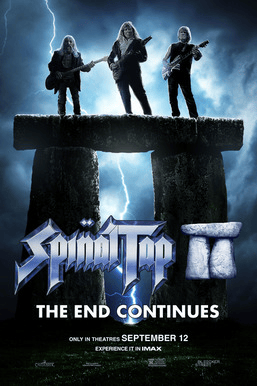EPIC: Elvis Presley in Concert
Posted on February 19, 2026 at 5:39 pm
A-| Lowest Recommended Age: | Middle School |
| MPAA Rating: | Rated PG-13 for smoking and some language |
| Profanity: | Mild language |
| Alcohol/ Drugs: | Smoking, some alcohol |
| Violence/ Scariness: | Sad death of a parent off-screen |
| Diversity Issues: | None |
| Date Released to Theaters: | February 20, 2026 |
Until someone invents a time machine, this movie is the only way you will get a chance to experience one of the most electrifying performers of the 20th century at the absolute height of his charisma and musicianship. Go see it, and if at all possible, see it in IMAX.

A professional film crew followed Elvis Presley for about a decade, with more than a thousand live concerts plus rehearsals, behind the scenes footage, and a remarkably candid audio-only interview that serves as the narration for this film. All of that footage was lost until director Baz Luhrmann tracked it down when he was working on his film with Austin Butler as Elvis. There were hours of footage, but the film was fragile and required extensive but very delicate restoration. (No AI, not a single frame, Luhrmann assures us.) That footage has now been assembled into an intimate documentary that shows us Elvis at his best, with the most touching and inspiring footage ever of this incessantly-filmed star, showing us, above all, his broad-ranging and deep love of music, of his audience, and of performing. In under two hours, we hear many of his hits, including my two favorites, “Poke Salad Annie” and “Burning Love,” but also his mastery of an astonishing range of genres: country, R&B, gospel, honky tonk, pop, and rock. When he sings Beatles and Simon and Garfunkel songs, it is not because he is trying to compete or keep up; he genuinely loves their music and brings his own understanding of what makes them great.
An introduction gives us an impressionistic mosaic of what has led up to his decision to focus on live performance. We see his early years and his being drafted into the Army and serving in Germany. That would be his only time outside of the United States, and we later hear his wistful longing for a chance to perform in Europe. (His manager, “Colonel” Tom Parker, would not allow him to tour internationally, for a reason we did not learn until both had died: Parker, a Dutch citizen, was in the US illegally and feared that if he left he would not be allowed back into the country.)
We get a sense of his overwhelming life. He is always gracious despite the obnoxious and insulting questions from the press and the constant attention and neediness of those around him. He jokes about Ed Sullivan telling the cameras to show him only above the waist, and about how his sparkly suit is too tight to allow him to kneel.
His interactions with his musicians are mutually respectful, friendly, good-humored, but very professional and specific. He knows what he wants to sing, when it should come in the show, and what it should sound like. He works very hard, telling us he loses 4 or 5 pounds with each performance. At times he looks as skinny as when he first appeared in public.
Elvis is too often reduced to the caricatures of his last years, overweight, ostentatious bling and caped jumpsuits, fried banana sandwiches, giving away cars. It is pure joy to replace that with these vibrant, pulse-pounding, genuinely thrilling performances, very skillfully edited to match the rhythm of the music. We see the wildly appreciative audience (including Cary Grant and Sammy Davis, Jr., who show up after the performance in Presley’s dressing room to say hello, and one-time co-star, dancer Juliet Prowse). Fitting for the gospel and gospel-influenced delivery, at times it feels like a soul-stirring church service. Some of the venues are quite small by today’s arena standards, giving it a palpable air of humility, grace, and connection. We are on stage with him, and one of the purest joys of the film is the private smile when he thinks he has done well. He comes alive in performative mode, drawing energy from the crowd. But that smile of satisfaction invites us into a world that is just Elvis and his music. Thanks to Luhrmann and most of all to Elvis Presley for reminding us — and making available forever — a genuine superstar.
Parents should know that there are some suggestive lyrics and some drinking answers smoking.
Family discussion: Which is your favorite Elvis song? Who is most like Elvis today?
If you like this, try: “Elvis: The Searcher,” “Viva Las Vegas,” and “Elvis: That’s the Way It Is”







